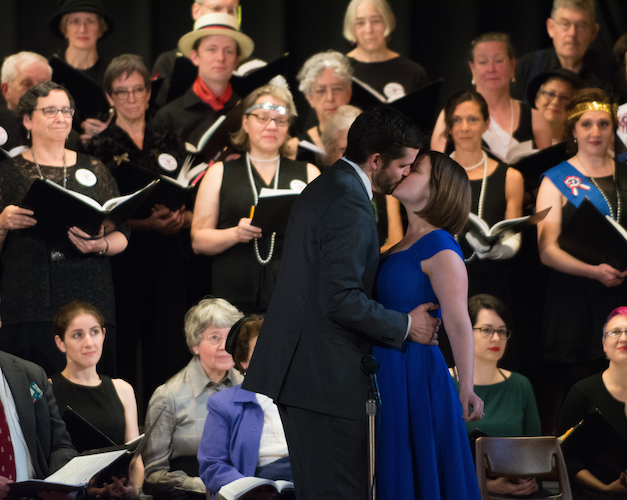Concert Review: Gershwin’s “Of Thee I Sing” at Robbins Auditorium
In all, Chorus pro Musica’s production was witty and diverting, timely in spots and smart throughout

A scene from the Chorus pro Musica concert version of “Of Thee I Sing.” Photo: Sam Brewer.
By Jonathan Blumhofer
“Well, that was extremely silly.” Such was the succinct verdict of a patron in my vicinity after the last notes of George and Ira Gershwin’s Of Thee I Sing sounded last Saturday night at Arlington’s Robbins Memorial Town Hall Auditorium. Chorus pro Musica’s (CpM) season finale was, indeed, a batty – sometimes downright absurd – musical. The nine justices of the Supreme Court determining the gender of a newborn baby? That’s just the capper. There’s a bumbling vice president who doesn’t know where the Capitol is, a press more interested in tabloid gossip than news, and a whole plotline derived from the supposed illicit behaviors of Napoleon’s lineage, among many others.
But amid all the farce – and there’s quite a bit of it – Of Thee I Sing offers some still-trenchant satire. The 1931 show, which (the music excepted) was awarded that year’s Pulitzer Prize for drama, has, in its broad lampooning of political shenanigans not aged too badly. As a piece, it gleefully skewers everything from the inane to the profound, and it does it all with a knowing series of winks.
The story centers on the campaign and election of John P. Wintergreen, a presidential candidate with no prior political experience whose handlers decide to run him on a platform of love: something that “everybody is interested in, and that doesn’t matter a damn.” In an anticipation of The Bachelor by about eight decades, they arrange for a beauty pageant; the winner’s prize is to marry Wintergreen and become first lady. The candidate, though, thwarts that scheme by falling in love with a certain Mary Turner (because – why not? – she makes the world’s best corn muffins) and rejecting the contest’s winner, the alluring Diana Devereaux. She sues him for breach of contract and an international incident (with France) threatens when it’s revealed that Devereaux is an illegitimate descendant of Napoleon’s. Equanimity is restored, though, when Wintergreen hands the jilted lady off to his vice president, the aptly-named bachelor Alexander Throttlebottom; he continues on happily ever after with Mary.
So, yes, it’s wacky. But it’s knowingly so. And the music only reinforces this characteristic. Gershwin’s score is tightly integrated across both of Of Thee I Sing’s two acts. It’s ever-tuneful and has a number of great songs in it – “Love is Sweeping the Country,” “Who Cares?,” and the title song among them – even if it’s structured to avoid set pieces more often than not.
Above all, Gershwin’s writing is remarkably deft and, on more than a few occasions, filled with clever references: the arrival of the French ambassador, for one, mashes up An American in Paris with the Marseilles. If the whole thing never quite reaches the exalted heights of Gilbert and Sullivan at their finest, well, chalk that up to the fact that the show hails from a different time and place, and was written for a very different audience.
Saturday’s performance was exceedingly well sung. CpM was consistently in fine voice, singing with robust tone, excellent blend, and terrific diction. There were a couple of moments of imbalance and, over the last part of Act 2, some tentativeness tackling the music’s shifting tempos. But the overall performance, from the lively “Wintergreen for President” (with campaigners from the chorus carrying signs up and down the aisles) to the soaring title song to the vacuous “Posterity is Just Around the Corner,” was brisk and dashing.
The night’s leads were likewise fine. David McFerrin was a believably oblivious Wintergreen, charismatic and ruddy-voiced. Margot Rood was superb as his love interest. Her voice seemed ideally built for this type repertoire: light, even, and clear across its whole range, especially in the handful of less-than-flattering high-register solos Gershwin wrote for the part (like “I’m About to Be a Mother”).
Christina English’s Devereaux was a fully-lived caricature, seductive, warmly-sung, and quite funny (especially as she shifted between Southern and French accents in each act). Also fine was Scott Muldoon’s daffy Throttlebottom and Dan Malis’ pompous French ambassador.
The score’s myriad other roles were taken by members of the chorus. If their spoken dialogues were generally on the stiff side, the sung portions came over well. CpM music director Jamie Kirsch directed the whole thing with panache. And, while the accompanying instrumental ensemble sounded a bit shaky in exposed passages, it capably backed up the bigger ensemble numbers.
In all, Saturday’s production was witty and diverting, timely in spots and smart throughout. Not only did it made a strong case for Of Thee I Sing, but it also advanced the argument that more of Gershwin’s shows – particularly the other two political satires, Strike Up the Band! and Let ‘em Eat Cake! – should be brought into the ensemble’s repertoire, hopefully sooner rather than later.
Jonathan Blumhofer is a composer and violist who has been active in the greater Boston area since 2004. His music has received numerous awards and been performed by various ensembles, including the American Composers Orchestra, Kiev Philharmonic, Camerata Chicago, Xanthos Ensemble, and Juventas New Music Group. Since receiving his doctorate from Boston University in 2010, Jon has taught at Clark University, Worcester Polytechnic Institute, and online for the University of Phoenix, in addition to writing music criticism for the Worcester Telegram & Gazette.
Tagged: Chorus pro Musica, George Gershwin, musical, Of Thee I Sing, political
